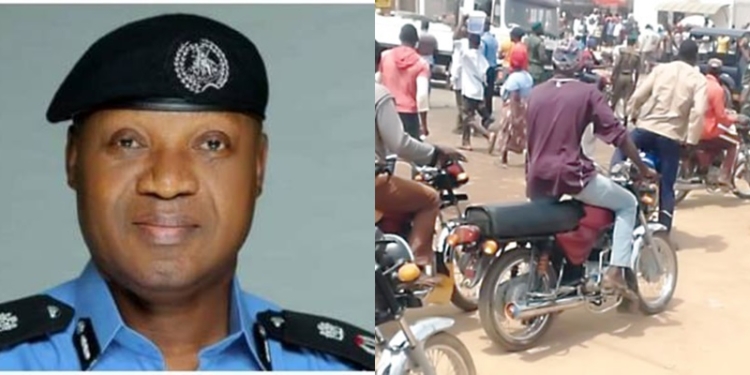Hours after the ban of commercial motorcyclists, popularly called Okada riders, the Lagos police commissioner, Abiodun Alabi, has revealed that most of them, are criminals who have been caught with pistols.
Speaking on Channels TV’s Sunrise Daily, monitored by SaharaReporters, Alabi also disclosed that a lot of these riders are not licensed and only use the job to commit crimes.
He said, “There have been consultations with their executive members in various communities and what we have been able to discover is that most of them are not even licensed and before God and man, I will assure you and I want to be emphatic here, that most of them are criminals masquerading as Okada riders.
“We have arrested so many of them with locally made pistols in the course of their operations and many of them have been charged to court. But we know that they are using Okada as a kind of disguise to perpetuate their crime in many communities.
“And that’s the reason why we have been having a lot of dialogue, consultations and meetings with their union and in the course of doing that, I believe that the best way out is to get them off our roads. Most of them are masquerading as Okada riders but they are criminals.”
Babajide Sanwo-Olu, governor of Lagos, on Wednesday, announced the ban on operations of commercial motorcyclists in six local government areas of the state.
The local government areas affected by the ban are Ikeja, Surulere, Eti Osa, Lagos Mainland, Lagos Island and Apapa.
Alabi said the ban on the operations of commercial motorcyclists in the state, vowing that they will not be allowed to ply prohibited routes.
“Over time people have been enforcing it but they have not been enforcing it in a holistic manner.
“We are going to change our tactics and strategy and we are going to win the whole war and ensure that the war is enforced better by not allowing anybody to ply these routes. Anybody arrested will be made to face the law,” he said.
Alabi noted that the 2020 #EndSARS protests led to the lackadaisical attitude of police officers, saying they allowed the Okada riders back into the areas where they have been banned.
“I believe what is going to be different is the officers will do the bold work to enforce the law and ensure that the Okada riders don’t ply the roads where they have been prohibited.
“I remember vividly that those Okadas plying those routes were not allowed previously but along the line after the #EndSARS saga, there was a kind of lackadaisical attitude on the part of the police officers in Lagos because they were not actually encouraged since they were at the centre of the crisis.
“That is the reason why they got back in and the rule was not enforced,” he said.
Alabi said the police force has the capacity to enforce laws without turning them into a cash cow, adding that other security agents will also collaborate with the police to ensure that the law is enforced.
He said in the last three days, no fewer than 215 motorcycles have been impounded and 35 defaulters have been arrested in the Lekki-Ajah axis.
He also said there will be a mobile court where erring passengers and motorcyclists will be prosecuted immediately so as to avoid cell congestion.
Lagos has a history of banning commercial motorcyclists without successful implementation.
In 2006, the Bola Tinubu government announced a restriction on the operating hours of Okada riders as it banned them from operating between 7 pm and 6 am every day.
The Lagos State Government in 2012 under the Babatunde Fashola Administration placed a total ban on the operations of commercial motorcycles in the Ikeja axis of the state.
The ban was followed by a directive to the police to arrest any rider found operating on major roads in Ikeja.
At the time, the state government said no Okada rider must be found in areas such as Oba Akran Avenue, Bank Anthony Way, Isaac John Street, Opebi Link Bridge, Adekunle Fajuyi Way, Acme Road, Alausa, Oregun, Simbiat Abiola Way and Kodeso Road.
Also, in 2017 under Akinwunmi Ambode’s administration, the Lagos State Government again announced a ban on Okada activities on major highways, bridges and roads.
It listed hundreds of routes where motorcycles and tricycles (aka Okada and Keke) had been banned.
The list included major highways, bridges, etc. in Lagos.
Governor Babajide Sanwo-Olu in January 2020 proscribed operations of motorcyclists and Keke riders in six local government areas, nine local council development areas and 10 major highways across the state with effect from February 1, 2020.
The government also banned Okada and tricycles from plying 40 bridges and flyovers across the state.
At the time, bike-hailing services such as Max, Gokada and Opay were in operation across major highways in the state. These were also later banned as they were affected by the Okada ban. However, dispatch riders, food delivery riders and other logistics players like GIG logistics, Domino’s Pizza, and Max Delivery, were allowed to remain in operation.
It was observed that each time these bans were announced, the Lagos State Task Force set into action, impounding several motorbikes and tricycles.
However, the enforcement was usually short-lived as many motorcycles and tricycles returned to the previously restricted areas, particularly the highways as the demands for them increased.








Discussion about this post